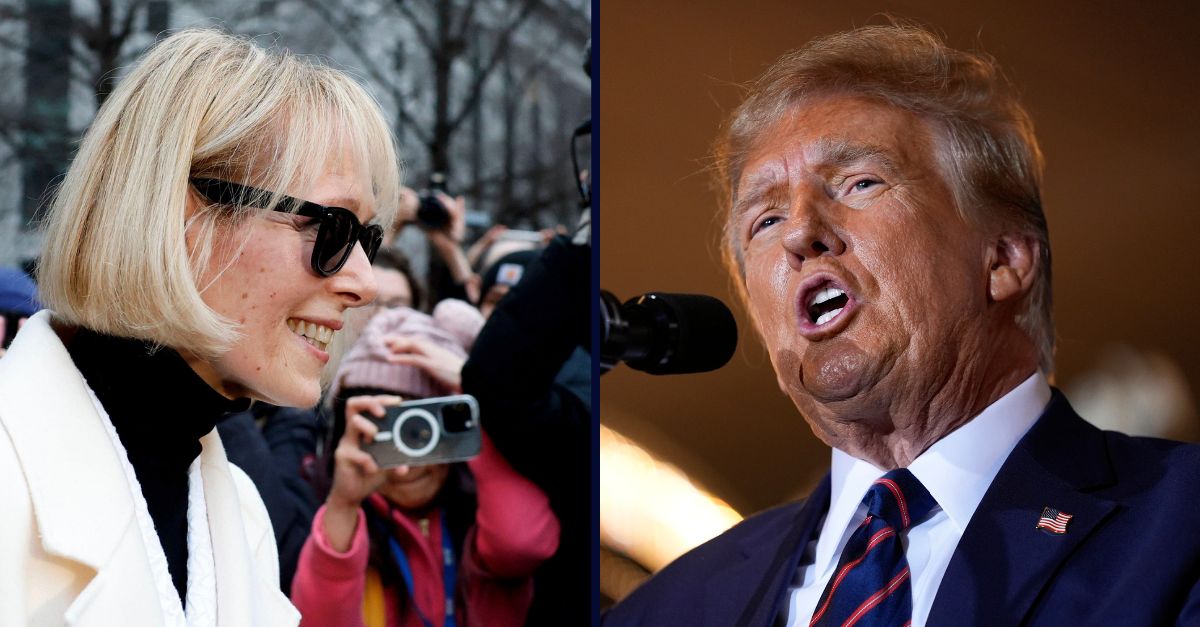
Left: Journalist E. Jean Carroll departs from the courthouse after the conclusion of the damages trial against Donald Trump at Manhattan Federal Court on Friday, January 26, 2024 in New York City (John Angelillo, Alamy Live News via AP). Right: Republican former President Donald Trump speaks at a primary election night party in Nashua, N.H., Jan. 23, 2024. (AP Photo/Matt Rourke).
Donald Trump was directly called out by an attorney representing E. Jean Carroll during oral arguments before a federal court of appeals in lower Manhattan as the former president tried to obtain a new trial in the author's sexual abuse and defamation lawsuit late Friday morning.
"Mr. Trump is here today," Carroll's attorney, Roberta Kaplan, announced.
The plaintiff's lawyer seemingly mentioned the 45th president out loud to bring attention to the fact that "he chose not" to call a single witness during the trial he is now aiming to replace with a do-over.
Somewhat in lieu of the defendant's own testimony, Kaplan said, her client played jurors the September 2005 "Access Hollywood" tape in which Trump brags to host Billy Bush about being allowed to "grab" women's genitals due to the caliber of his celebrity. Describing that footage, Kaplan repeated the colloquial term used by Trump, apologizing the second time around before her time was up.
At the Thurgood Marshall U.S. Courthouse on Friday, Trump was the appellant — and his attorney D. John Sauer went first.
The case, Sauer argued, was a "quintessential he-said she- said" situation. During the trial, there was no physical evidence introduced, but rather, several pieces of prejudicial propensity evidence judge Lewis Kaplan should have never allowed to reach jurors' ears.
In May 2023, a civil jury in New York found that Trump sexually abused Carroll in the dressing room of New York City department store Bergdorf Goodman sometime in the late 1990s — and later defamed her when strongly denying the allegations, and denied ever knowing Carroll, to the press, ordering him to pay his victim $5 million.
Sauer argued that trial was fatally flawed because the judge allowed in several flawed pieces of evidence — chiefly the testimony of other Trump accusers Jessica Leeds and Natasha Stoynoff, who were not part of the complaint. Leeds' allegations, in particular, were a cause for concern, Trump's attorney argued, because they alleged a sexual assault on an airplane in the 1970s. And, Sauer said, there was no federal statute prohibiting sexual assault at that time.
The three-judge panel, however, appeared somewhat skeptical of the evidentiary focus by the ex-president's attorney.
Senior U.S. Circuit Judge Denny Chin mused that it was "very hard to overturn a jury verdict based on evidentiary rulings" and asked Sauer to clearly state why a new trial should be granted.
In sum, Trump's attorney argued, what was and what was not allowed during the trial was "erroneous under any standard of review."
Later, moments after being admonished by a judge for speaking too fast to be understood, Sauer's first time at the dais was up.
Roberta Kaplan began by seeking to dispute Sauer's argument about sexual assault on airplanes and when the relevant crime became federal law. There was a statute in 1979 prohibiting assault on a plane "in a special aircraft jurisdiction," Carroll's attorney said, which cross-references a crime prohibiting unwanted sexual contact, saying the "predecessor crime" was simple assault, not rape. The upshot of this discussion was to try and bless the admission of Leeds' testimony.
"It was a crime then to grope someone on a plane, it is a crime today to grope someone on a plane," Carroll's attorney said.
After the judges expressed some skepticism about the Leeds evidence, Roberta Kaplan argued that her client did not need any of the propensity evidence to defeat the new trial bid.
"I can lose all the propensity evidence and it would still be harmless error," Carroll's attorney said.
However, Roberta Kaplan says her client would still be allowed to introduce the "Access Hollywood" tape because, rather than being used to show Trump's propensity to commit a crime, the tape can be introduced as an "admission" or confession.
"He did not put on a single witness in the civil case," Roberta Kaplan said. "We put on 11. But what we did put in is his — this videotape of 'Access Hollywood' where he basically says, 'I grab women by the p—-,' excuse my language, without their consent. And then at his deposition that I took and asked him about that video, what did he say? He embraced it!"
During a brief rebuttal, Sauer said the standard for harmless error had clearly not been met because the opposing party would have to show that it could not have influenced the jurors.
"That argument really can't be made with a straight face here," Trump's attorney said.
Pressed as to the defendant's ability — during the trial — to cross-examine the witnesses against him, Sauer said the improper implications were also "relentlessly hammered" during Carroll's opening statement and summation.
One the judges interjected to say: "I didn't see the relentless hammering that you're referencing."
Sauer said the allegedly bad evidence, however, took up four pages of the plaintiff's opening before they even got to Carroll's case.
Trump's attorney was then asked to address the idea that the "Access Hollywood" tape was a confession. Sauer said Carroll never pointed to "any specific incident" Trump was allegedly confessing to.
Moments later, the lawyer's time expired, so he cut himself off, and the court declared: "We will take this case under advisement." A ruling is not expected any time soon.
Procedural issues made the Carroll trials somewhat topsy-turvy. In the Second Circuit, Trump is disputing a defamation verdict stemming from statements made in 2022. This case is referred to as Carroll II. In January, a court awarded Carroll $83 for defamation stemming from comments made in 2019 — a case referred to as Carroll I.